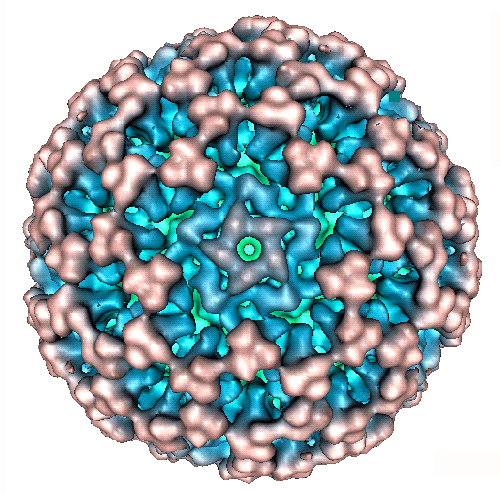|
[ Aquareoviruses.htm ] [ Coltiviruses.htm ] [ Aquabirnavirus-IPNV.htm ] [ Cypovirus.htm ] [ Dinovernavirus.htm ] [ Idnoreoviruses.htm ] [ Cystoviruses.htm ] [ index.html ]
The dsRNA genome segments and proteins of mammalian
orthoreovirus-3
(MRV-3)
(genus
Orthoreovirus: family Reoviridae )
(available
as a word file)
updated August 2003
|
dsRNA
(Size,
bp) |
ORFs
(bp
inclusive) |
Proteins
( ':
protein structure/ function) |
Protein
Size
aa
(kDa) |
Protein
copy number per particle |
Location |
Protein
Function
|
|
L1
(3854) |
19-3819 |
l
3 (Pol) |
1267
(142) |
12 |
core |
Fully
conservative RNA dependent RNA polymerase |
|
L2
(3916) |
14-3880 |
l
2 (CaP) |
1289
(144) |
60 |
core
spike |
Guanylyltransferase,
methyltransferase Aturret@
protein .
Comparable to
the cypovirus turret protein VP3(CaP) . |
|
L3
(3901) |
14-3838 |
l 1
(Hel) |
1275
(143) |
120 |
core |
Inner capsid
structural protein, binds dsRNA and zinc, putative NTPase, helicase and
5’-triphosphate phospohydrolase.
Structurally
comparable to the orbivirus sub core protein VP3, the rotavirus inner
capsid protein VP2, phytoreovirus inner capsid protein P2 and cypovirus
capsid shell protein VP1. |
|
M1
(2304) |
14-2221 |
µ2
|
736
(83) |
12 |
core |
NTPase,
influences the morphology of inclusion bodies, interacts with
cytoskeleton |
|
M2
(2203) |
30-2153 |
µ1
µ1C
(T13)
d
f
m 1N |
708
(76)
667
(72)
539
(59)
128
(13)
42
(4) |
30
600
600 |
outer
capsid
|
Multimerizes
with s3.
Cleaved to m1C
and m1N, which
assume T=13 symmetry in the outer capsid
m 1C
is cleaved to d
and f during
the entry process. Myristoylated N-terminus, membrane penetration |
|
M3
(2241) |
19-2181 |
µNS
µNSC |
721
(80)
681
(75) |
0 |
N
/ S |
Binds ssRNA and
virus cores, primary determinant of inclusion body formation [1], interacts
with m2 and sNS,
phosphoprotein, coiled coil motifs, transcriptase interaction, genome
packaging?
µNSC is from
alternate translation start site, unknown function |
|
S1
(1416) |
13-1377
71-430 |
s 1
s 1s |
455
(49)
120
(16) |
36
0 |
outer
capsid
N
/ S |
Cell attachment
protein, homo-trimer, haemagglutinin, type-specific antigen, possible
glycosyl hydolase activity , induces apoptosis
basic protein,
nonessential, blocks cell cycle progression |
|
S2
(1331) |
19-1272 |
s 2 |
418
(47) |
150 |
core |
inner capsid
structural protein, weak dsRNA-binding, morphogenesis? |
|
S3
(1189) |
28-1125 |
s NS |
366
(41) |
0 |
N
/ S |
ssRNA-binding,
associates with mNS
during inclusion body formation [1], genome packaging? |
|
S4
(1196) |
33-1127 |
s 3 |
365
(41) |
600 |
outer
capsid |
dsRNA-binding,
multimerizes with µ1C, nuclear and cytoplasmic localisation,
translation control |
' :
Protein
structure/function: RNA polymerase = A(Pol)@;
capping enzyme = A(CaP)@;
Virus structural protein with T = 13 symmetry = A(T13)";
)". Protein with helicase activity = "(Hel)".
Other
species within the genus may have proteins with significant differences in
sizes.
Table
constructed using data supplied by Roy Duncan
If
you have any corrections or additional information to add to this webpage please
contact Peter Mertens on peter.mertens@bbsrc.ac.uk
(The RNAs and Proteins of dsRNA
Viruses: Edited by Peter. P. C. Mertens and Dennis H.
Bamford)
References
1. Becker MM, Peters TR, Dermody TS. (2003) Reovirus sigma NS and mu NS
proteins form cytoplasmic inclusion structures in the absence of viral
infection. J Virol. May;77(10):5948-63.

|

